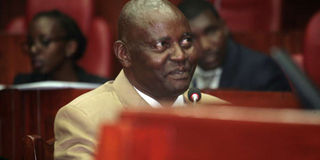Joe Muriuki wants to champion a regional solution to HIV/ Aids at Eala

Dr Joe Muriuki of Jubilee Party at Charter Hall in Nairobi on May 11, 2017. He wants to be nominated to Eala and says he would drive a regional integrated response towards addressing HIV/ Aids. PHOTO | FILE | NATION MEDIA GROUP
What you need to know:
- He wants to push for a regional strategic plan and treatment regime that will make a mark on the management of HIV/ Aids in East Africa.
When Parliament meets on December 13 to pick the country’s nominees to the East African Legislative Assembly (Eala) in Dar es Salaam, Tanzania, the name of little known Dr Joe Muriuki will stand out among the 27 shortlisted applicants.
Dr Muriuki, 53, has been living with HIV/ Aids for the last 33 years having gone public in 1988 when the Daily Nation highlighted his story.
AGENDA
Dr Muriuki, who was shortlisted by Jubilee Party, teaches Epidemiology at Mount Kenya University.
He hopes to be among the nine to represent the country in the regional assembly because of his unique agenda for the region.
“I would want to drive a regional integrated response towards addressing the scourge within the East Africa Community. This will ensure that we produce our own medicines, procure treatment instead of depending on donors to do what we can do as a region,” Dr Muriuki says.
If nominated, Dr Muriuki has promised to lobby for increased representation of special interest groups including women living with HIV in the region, and push for the enactment of country-specific HIV/ Aids equity tribunal to be fashioned on Kenya’s HIV/ Aids Prevention and Control Act (HAPCA) of 2006.
“The agenda may be quite peripheral from the usual stuff at Eala but it represents the change that the region wants,” he says.
WAY FORWARD
He says that the current stand-alone approach where the East African member countries are employing different measures to minimise the spread of the disease has not addressed the problem.
Dr Muriuki, who has published widely on HIV/ Aids, says that it is time for East Africa to unite and produce its own anti-retroviral drugs and also establish a fund.
“As a region, we need a response that is consolidated in attitude. Suppose the donor money and drugs were discontinued, I would begin counting my last days!” he says.
According to Dr Muriuki, at least 11 million people in East Africa are living with the disease out of which 1.6 million are in Kenya.
The figures, he says, present a chance to push for a regional strategic plan and treatment regime that will make a mark on the management of HIV/ Aids as opposed to the current disjointed plan.
SOLUTION
Currently, there is an upsurge of the disease within the region with those between 12 and 25 years the most affected because of inter-generational sex.
Though legal regimes to addressing the epidemic have been established among the member states in the region, Dr Muriuki says that the extreme conditions exhibited by member countries pose a challenge.
For instance, Kenya has a liberal or denial approach while Uganda’s regime is brutal. Those found to be promoting homosexual tendencies in Uganda are liable for a death sentence.
“Every country has its own politics but we need a harmonised approach – let us not bury our heads in the sand and pretend that everything is well, let us deal with the situation as it is.”
Dr Muriuki also noted that the prevention of mother-to-child transmission that has 56 per cent coverage in the country is “pathetic” at a time “we should be making the required strides since the epidemic was first reported in the early 1980s.”





